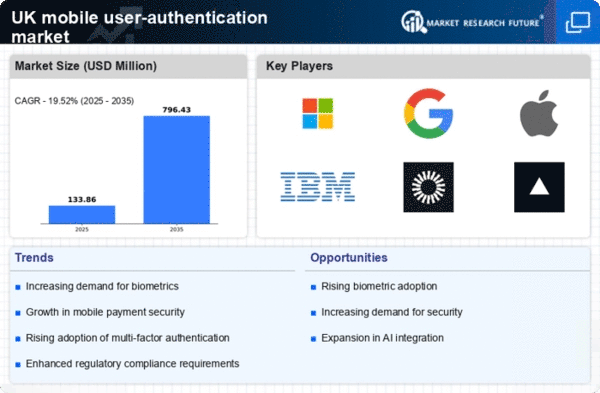Consumer Demand for Convenience
The mobile user-authentication market is propelled by the growing consumer demand for seamless and convenient access to digital services. As mobile applications proliferate, users increasingly expect quick and easy authentication processes. In the UK, a survey indicated that 75% of consumers prefer biometric authentication methods due to their speed and ease of use. This shift in consumer preferences is driving businesses to adopt innovative authentication solutions that enhance user experience while maintaining security. The market is likely to witness a surge in investments aimed at developing user-friendly authentication technologies, with projections suggesting a market value increase to £2 billion by 2027. This demand for convenience is a pivotal factor influencing the mobile user-authentication market.
Increasing Cybersecurity Threats
The mobile user-authentication market is experiencing heightened demand due to the increasing frequency and sophistication of cyber threats. In the UK, data breaches and identity theft incidents have surged, prompting businesses to seek robust authentication solutions. According to recent statistics, the UK witnessed a 30% rise in reported cyber incidents over the past year. This alarming trend compels organizations to invest in advanced mobile user-authentication technologies to safeguard sensitive information. As a result, the market is projected to grow significantly, with an estimated value of £1.5 billion by 2026. The urgency to protect user data drives the innovation and adoption of secure authentication methods, shaping the mobile user-authentication market.
Regulatory Compliance Requirements
Stringent regulatory frameworks significantly influence the mobile user-authentication market by protecting consumer data. In the UK, regulations such as the General Data Protection Regulation (GDPR) and the Payment Services Directive (PSD2) mandate enhanced security measures for user authentication. Compliance with these regulations is not merely a legal obligation but also a competitive advantage for businesses. Companies that implement effective mobile user-authentication solutions can avoid hefty fines and enhance their reputation among consumers. The market is expected to expand as organizations prioritize compliance, with an estimated growth rate of 20% annually. This regulatory landscape is a crucial driver for the mobile user-authentication market, pushing businesses to adopt advanced technologies.
Rise of E-commerce and Digital Transactions
The mobile user-authentication market is significantly influenced by the rise of e-commerce and digital transactions in the UK. As online shopping becomes increasingly prevalent, the need for secure authentication methods to protect consumer transactions is paramount. Recent data indicates that e-commerce sales in the UK reached £200 billion in 2025, highlighting the critical need for robust security measures. Businesses are compelled to adopt mobile user-authentication solutions to mitigate risks associated with online fraud and enhance customer confidence. This growing reliance on digital platforms is likely to drive the mobile user-authentication market, with projections estimating a market growth of 25% over the next three years. The expansion of e-commerce is a vital driver for the mobile user-authentication market.
Technological Advancements in Mobile Devices
Rapid technological advancements in mobile devices benefit the mobile user-authentication market. The proliferation of smartphones equipped with advanced sensors and processing capabilities enables the implementation of sophisticated authentication methods. In the UK, the adoption of devices with biometric capabilities has increased, with over 60% of smartphones now featuring fingerprint or facial recognition technology. This trend facilitates the integration of secure authentication solutions into everyday mobile applications, thereby enhancing user trust and engagement. As manufacturers continue to innovate, the mobile user-authentication market is expected to grow, with an estimated CAGR of 18% over the next five years. The evolution of mobile technology is a key driver for the mobile user-authentication market.
















